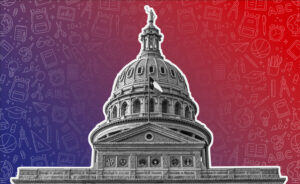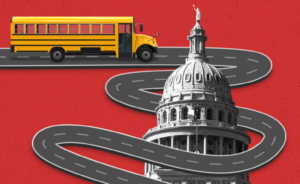Shifting Focus: Addressing the Full Spectrum of Public Education Challenges

It was no surprise the voucher conversation dominated the 2023 legislative session, which meant most of our member communications during that time frame were dedicated to fighting that battle. With special sessions, the summer and fall felt like all vouchers, all the time.
At the end of the day, we were able to hold off vouchers, and that’s certainly a positive. But since then, unfortunately, the voucher issue has anything but subsided. Although passing vouchers has become Gov. Greg Abbott’s primary, if not only, education policy goal, vouchers are certainly not the only concern of public educators.
Many educators reading this article may understandably ask how we can claim vouchers are the only goal of the governor and his cronies when we seem to be constantly inundated with attacks over the content of library books and “woke indoctrination.” There is no denying the teaching profession has become embroiled in culture wars in a way it never had before. However, many of these issues that create so much controversy are being ginned up for no other reason than to drive a wedge between supporters of public education and break the blockade against vouchers.
The fact is, public education has enjoyed broad support over the years from the actual public—much more so than from some of the political class—and that support has bolstered our ability as a state to resist privatization schemes.
Shifting Focus
While the privatizers and voucher pushers continue to do their best to manufacture division, outside the culture war trenches, there are plenty of non-voucher or voucher-linked issues that public educators legitimately need lawmakers to focus on. Examples include: the teacher pipeline, discipline, teacher pay, school resources, and, generally, how to improve outcomes for Texas’ 5.5 million public school students. These issues have nothing to do with privatization, and they’re real public school issues that need to be addressed.
For example, let’s briefly discuss the pipeline. Although we have more educator preparation programs in Texas than in much of the rest of the country put together, Texas has much room to improve quality and ensure all programs prepare educators in ways that make them more likely to succeed. For a long time, ATPE has supported increasing standards for those particular programs, including who can participate and what they offer.
But instead of making those improvements, we’re at a point where districts are putting hundreds—if not thousands—of flat-out uncertified teachers in classrooms each year. While we must acknowledge the realities of hiring, including a teacher shortage with roots in low pay and difficult working conditions, it is untenable to have uncertified teachers with no real background in education come in and remain uncertified forever. We don’t see that anywhere else in the country.
In fact, many states don’t allow uncertified teachers at all. Other states may have about a one-year window before you must get certified. This is something we must address, both as a policy issue that doesn’t necessarily require a whole lot of money and as a finance issue in terms of creating a grant program to help districts fund people getting certified.
Creating Change
There are many ways educators can make an impact on Texas education policy. Legislators need to hear from you. No one knows better than you what goes on in the classroom on a day-to-day basis, so no one has a better handle on the problems you face and the potential solutions. ATPE’s Advocacy Central makes it easy to communicate with your legislator. We also have tools, such as the ATPE and Teach the Vote blogs, our advocacy column, the ATPE Podcast, and the soon-to-debut ATPE Online Community where we discuss the issues educators should be thinking about.
The other thing, obviously, is that education is highly regulated by elected politicians, so it is important for educators to continue to be very involved with the elections process, both personally and with their colleagues. Not only do you need to vote pro-public education, but you need to encourage your friends, family, colleagues, and neighbors to do so.
We can’t take for granted that folks outside the education profession know what’s going on. Most non-educators don’t have a strong grip on education issues or the validity of the proposed solutions, so we must do a better job making the public understand the importance of demanding good public education policy and resources from their state-level elected officials, who determine the vast majority of education policy.
As we are doing more outreach to the broader community, we must also be more direct when countering the false narratives that have turned some people away from public education. It starts at home in your own community. Be open and honest about what’s going on in your classroom and what you need to be successful. Educators need to make their voices heard, and one of ATPE’s most important roles is providing you with the tools and information you need to do just that.
Community Partners
At our annual ATPE Summit, we ratify our legislative program, and over the past year, the ATPE Legislative Committee went through the process of refining and reorganizing that program.
In addition to reorganizing the program, the member committee added a preamble:
“As the preeminent group of educators in our state, the Association of Texas Professional Educators (ATPE) seeks, in partnership with parents, public officials, and other community members, to provide current and future generations of young Texans with a free and appropriate public education. Texas students deserve the opportunity to receive a well-rounded education. We believe it is the state’s constitutional duty to provide adequate funding for the provision of safe, modern schools and the resources required to meet the needs of all students and those who educate them. We further believe educators are the single most important resource in Texas public schools and that the state must provide the compensation and support required to attract and retain highly qualified, caring professionals.”
Isn’t that inspiring? I would love to see this posted in every classroom and educator workspace across the state. Crucial for reaching these goals is our ability to partner with our communities to better communicate ideas and share resources in service of teachers, students, and all of public education.
In closing, we are obviously going to continue to fight. Again, the voucher issue is not going away. Jeff Yass just gave an additional $4 million to Abbott in his attempt to buy the Texas Legislature from his comfy home in Pennsylvania. But we want everyone to understand that we recognize that vouchers are one of a multitude of issues that we are focused on, and we fully intend to draft some of our members—including, we hope, you as partners in that work.




